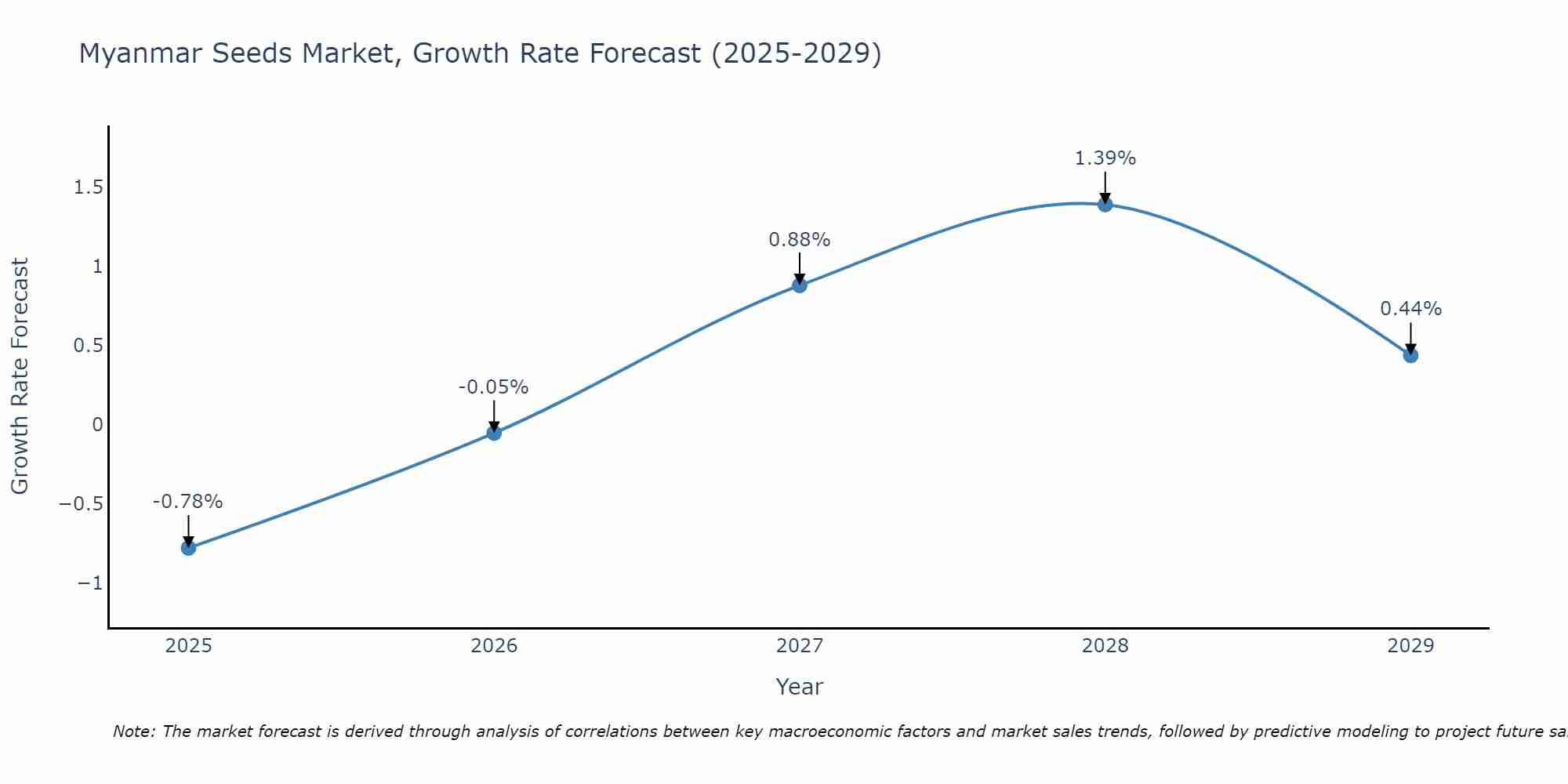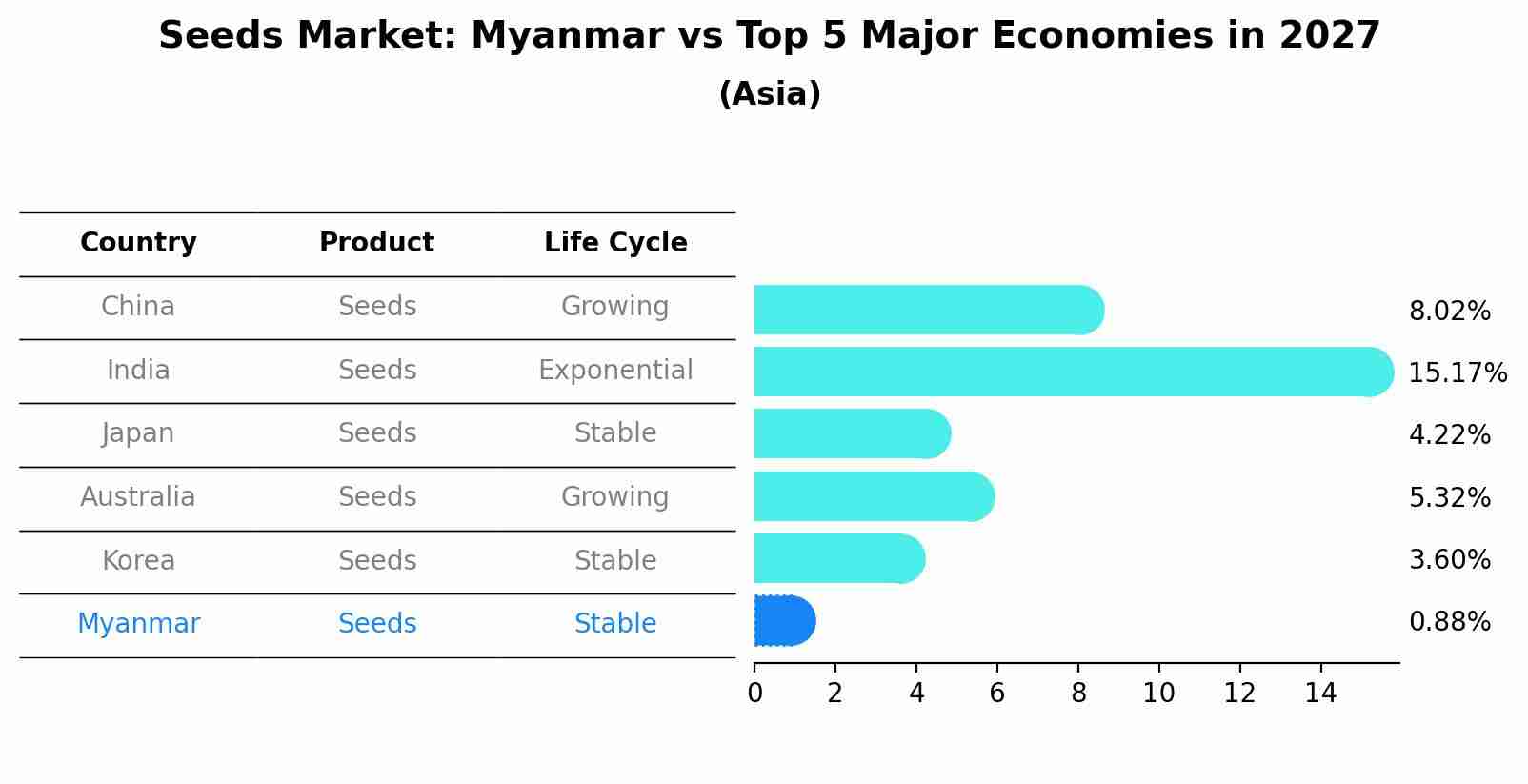Myanmar Seeds Market Outlook | Trends, Forecast, Analysis, Value, Growth, Industry, Revenue, Share, Companies, Size & COVID-19 IMPACT
| Product Code: ETC384694 | Publication Date: Aug 2022 | Updated Date: Jul 2025 | Product Type: Market Research Report | |
| Publisher: 6Wresearch | Author: Sumit Sagar | No. of Pages: 75 | No. of Figures: 35 | No. of Tables: 20 |
Myanmar Seeds Market Size Growth Rate
The Myanmar Seeds Market is projected to witness mixed growth rate patterns during 2025 to 2029. Growth accelerates to 1.39% in 2028, following an initial rate of -0.78%, before easing to 0.44% at the end of the period.

Seeds Market: Myanmar vs Top 5 Major Economies in 2027 (Asia)
The Seeds market in Myanmar is projected to grow at a stable growth rate of 0.88% by 2027, highlighting the country's increasing focus on advanced technologies within the Asia region, where China holds the dominant position, followed closely by India, Japan, Australia and South Korea, shaping overall regional demand.

Myanmar Seeds Market Synopsis
The Myanmar seeds market is witnessing growth due to increasing demand for high-quality seeds in the agriculture sector. Key factors driving this growth include a shift towards modern farming practices, rising awareness about the benefits of using improved seeds, and government initiatives to promote agricultural productivity. The market offers a variety of seeds such as rice, corn, pulses, and vegetables to cater to the diverse needs of farmers. Key players in the market are focusing on research and development to introduce hybrid and genetically modified seeds that offer better yields and resistance to pests and diseases. However, challenges such as limited access to credit for farmers, lack of awareness about modern farming techniques, and inconsistent government policies pose hurdles to the market`s growth. Overall, the Myanmar seeds market presents opportunities for both domestic and international seed companies to capitalize on the country`s agricultural potential.
Myanmar Seeds Market Trends
Currently, the Myanmar seeds market is experiencing a shift towards the adoption of hybrid seeds due to their potential for higher yields and improved resistance to pests and diseases. Farmers are increasingly seeking out hybrid seeds for crops such as rice, corn, and vegetables to enhance productivity and profitability. There is also a growing interest in genetically modified (GM) seeds, particularly in the corn sector, although the adoption rate is still relatively low. Climate-resilient and drought-tolerant seeds are gaining traction as farmers look for solutions to combat the challenges posed by erratic weather patterns. Overall, the Myanmar seeds market is witnessing a gradual but noticeable transition towards more advanced and technology-driven seed varieties to meet the evolving needs of the agricultural sector.
Myanmar Seeds Market Challenges
In the Myanmar Seeds Market, challenges include limited access to quality seeds, inadequate infrastructure for seed distribution, and a lack of awareness among farmers about modern seed technologies. The market is also hindered by inconsistent government regulations, which can impact seed imports and exports. Additionally, there is a need for more investment in research and development to improve seed varieties that are better suited to local conditions and climate change resilience. Overall, addressing these challenges will be crucial in unlocking the full potential of the Myanmar Seeds Market and supporting sustainable agriculture practices in the country.
Myanmar Seeds Market Investment Opportunities
The Myanmar Seeds Market presents promising investment opportunities due to the country`s increasing focus on agricultural development and modernization. With a growing population and rising demand for high-quality seeds for various crops, there is a need for improved seed technologies and varieties that can enhance crop yields and resilience to climate change. Investing in the production, distribution, and marketing of certified seeds, hybrid seeds, and genetically modified seeds tailored to local conditions can be lucrative. Additionally, supporting research and development initiatives in collaboration with local agricultural institutions can help introduce innovative seed varieties to the market. Overall, investing in the Myanmar Seeds Market has the potential for long-term growth and positive impact on the country`s agriculture sector.
Jordan Agar Market Government Policies
Government policies related to the Myanmar Seeds Market include the Myanmar Seed Law, which aims to regulate the production, import, export, and sale of seeds to ensure quality and promote the development of the domestic seed industry. The law requires seed producers and distributors to obtain licenses, adhere to quality standards, and participate in seed certification programs. Additionally, the government provides support for research and development in the seed sector, offers subsidies for seed production, and encourages the adoption of improved seed varieties through educational programs. Overall, these policies are designed to enhance seed quality, availability, and diversity in Myanmar, ultimately contributing to increased agricultural productivity and food security in the country.
Myanmar Seeds Market Future Outlook
The Myanmar Seeds Market is poised for significant growth in the coming years due to various factors. Increasing demand for high-quality seeds to enhance crop productivity, rising adoption of advanced farming techniques, and government initiatives to promote agriculture are driving the market forward. Additionally, the growing awareness among farmers about the benefits of using certified seeds and the rising trend of contract farming are expected to further boost market growth. The emergence of new seed varieties tailored to local conditions and changing climate patterns will also play a crucial role in shaping the future outlook of the Myanmar Seeds Market. Overall, with a favorable regulatory environment and increasing investments in the agriculture sector, the market is likely to experience steady expansion in the foreseeable future.
Key Highlights of the Report:
- Myanmar Seeds Market Outlook
- Market Size of Myanmar Seeds Market, 2021
- Forecast of Myanmar Seeds Market, 2031
- Historical Data and Forecast of Myanmar Seeds Revenues & Volume for the Period 2018 - 2031
- Myanmar Seeds Market Trend Evolution
- Myanmar Seeds Market Drivers and Challenges
- Myanmar Seeds Price Trends
- Myanmar Seeds Porter's Five Forces
- Myanmar Seeds Industry Life Cycle
- Historical Data and Forecast of Myanmar Seeds Market Revenues & Volume By Type for the Period 2018 - 2031
- Historical Data and Forecast of Myanmar Seeds Market Revenues & Volume By Genetically Modified (GM) Seed for the Period 2018 - 2031
- Historical Data and Forecast of Myanmar Seeds Market Revenues & Volume By Conventional Seed for the Period 2018 - 2031
- Historical Data and Forecast of Myanmar Seeds Market Revenues & Volume By Crop for the Period 2018 - 2031
- Historical Data and Forecast of Myanmar Seeds Market Revenues & Volume By Field Crops for the Period 2018 - 2031
- Historical Data and Forecast of Myanmar Seeds Market Revenues & Volume By Fruit & Vegetable Crops for the Period 2018 - 2031
- Historical Data and Forecast of Myanmar Seeds Market Revenues & Volume By Availability for the Period 2018 - 2031
- Historical Data and Forecast of Myanmar Seeds Market Revenues & Volume By Commercial Seeds for the Period 2018 - 2031
- Historical Data and Forecast of Myanmar Seeds Market Revenues & Volume By Saved Seeds for the Period 2018 - 2031
- Historical Data and Forecast of Myanmar Seeds Market Revenues & Volume By Seed Treatment for the Period 2018 - 2031
- Historical Data and Forecast of Myanmar Seeds Market Revenues & Volume By Treated for the Period 2018 - 2031
- Historical Data and Forecast of Myanmar Seeds Market Revenues & Volume By Untreated for the Period 2018 - 2031
- Historical Data and Forecast of Myanmar Seeds Market Revenues & Volume By Seed Trait for the Period 2018 - 2031
- Historical Data and Forecast of Myanmar Seeds Market Revenues & Volume By Herbicide Tolerant for the Period 2018 - 2031
- Historical Data and Forecast of Myanmar Seeds Market Revenues & Volume By Insecticide Resistant for the Period 2018 - 2031
- Historical Data and Forecast of Myanmar Seeds Market Revenues & Volume By Other Stacked Traits for the Period 2018 - 2031
- Myanmar Seeds Import Export Trade Statistics
- Market Opportunity Assessment By Type
- Market Opportunity Assessment By Crop
- Market Opportunity Assessment By Availability
- Market Opportunity Assessment By Seed Treatment
- Market Opportunity Assessment By Seed Trait
- Myanmar Seeds Top Companies Market Share
- Myanmar Seeds Competitive Benchmarking By Technical and Operational Parameters
- Myanmar Seeds Company Profiles
- Myanmar Seeds Key Strategic Recommendations
Frequently Asked Questions About the Market Study (FAQs):
- Single User License$ 1,995
- Department License$ 2,400
- Site License$ 3,120
- Global License$ 3,795
Search
Thought Leadership and Analyst Meet
Our Clients
Related Reports
- Canada Oil and Gas Market (2026-2032) | Share, Segmentation, Value, Industry, Trends, Forecast, Analysis, Size & Revenue, Growth, Competitive Landscape, Outlook, Companies
- Germany Breakfast Food Market (2026-2032) | Industry, Share, Growth, Size, Companies, Value, Analysis, Revenue, Trends, Forecast & Outlook
- Australia Briquette Market (2025-2031) | Growth, Size, Revenue, Forecast, Analysis, Trends, Value, Share, Industry & Companies
- Vietnam System Integrator Market (2025-2031) | Size, Companies, Analysis, Industry, Value, Forecast, Growth, Trends, Revenue & Share
- ASEAN and Thailand Brain Health Supplements Market (2025-2031) | Strategy, Consumer Insights, Analysis, Investment Trends, Opportunities, Growth, Size, Share, Industry, Revenue, Segments, Value, Segmentation, Supply, Forecast, Restraints, Outlook, Competition, Drivers, Trends, Demand, Pricing Analysis, Competitive, Strategic Insights, Companies, Challenges
- ASEAN Bearings Market (2025-2031) | Strategy, Consumer Insights, Analysis, Investment Trends, Opportunities, Growth, Size, Share, Industry, Revenue, Segments, Value, Segmentation, Supply, Forecast, Restraints, Outlook, Competition, Drivers, Trends, Demand, Pricing Analysis, Competitive, Strategic Insights, Companies, Challenges
- Europe Flooring Market (2025-2031) | Outlook, Share, Industry, Trends, Forecast, Companies, Revenue, Size, Analysis, Growth & Value
- Saudi Arabia Manlift Market (2025-2031) | Outlook, Size, Growth, Trends, Companies, Industry, Revenue, Value, Share, Forecast & Analysis
- Uganda Excavator, Crane, and Wheel Loaders Market (2025-2031) | Strategy, Consumer Insights, Analysis, Investment Trends, Opportunities, Growth, Size, Share, Industry, Revenue, Segments, Value, Segmentation, Supply, Forecast, Restraints, Outlook, Competition, Drivers, Trends, Demand, Pricing Analysis, Competitive, Strategic Insights, Companies, Challenges
- Rwanda Excavator, Crane, and Wheel Loaders Market (2025-2031) | Strategy, Consumer Insights, Analysis, Investment Trends, Opportunities, Growth, Size, Share, Industry, Revenue, Segments, Value, Segmentation, Supply, Forecast, Restraints, Outlook, Competition, Drivers, Trends, Demand, Pricing Analysis, Competitive, Strategic Insights, Companies, Challenges
Industry Events and Analyst Meet
Whitepaper
- Middle East & Africa Commercial Security Market Click here to view more.
- Middle East & Africa Fire Safety Systems & Equipment Market Click here to view more.
- GCC Drone Market Click here to view more.
- Middle East Lighting Fixture Market Click here to view more.
- GCC Physical & Perimeter Security Market Click here to view more.
6WResearch In News
- Doha a strategic location for EV manufacturing hub: IPA Qatar
- Demand for luxury TVs surging in the GCC, says Samsung
- Empowering Growth: The Thriving Journey of Bangladesh’s Cable Industry
- Demand for luxury TVs surging in the GCC, says Samsung
- Video call with a traditional healer? Once unthinkable, it’s now common in South Africa
- Intelligent Buildings To Smooth GCC’s Path To Net Zero


















